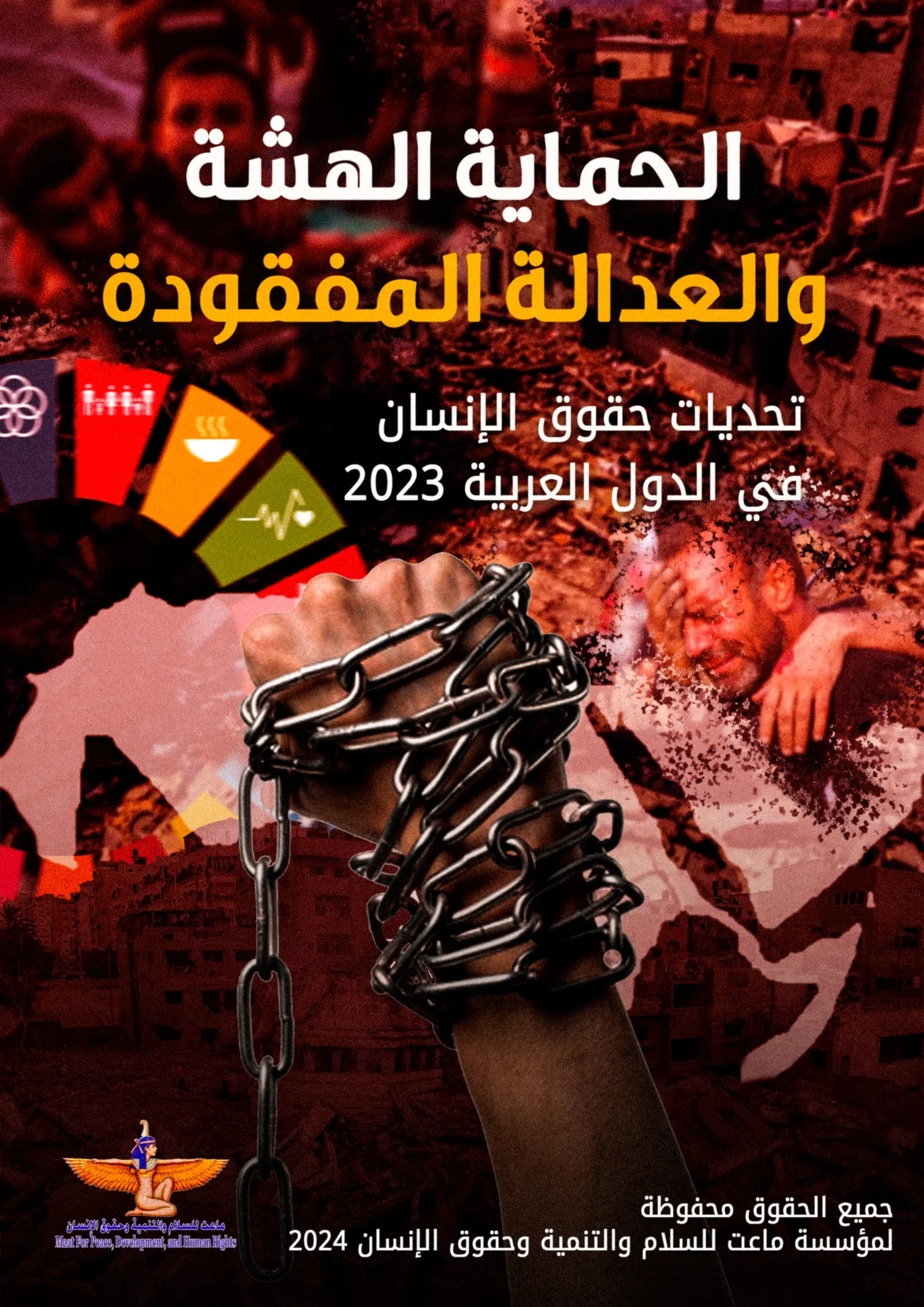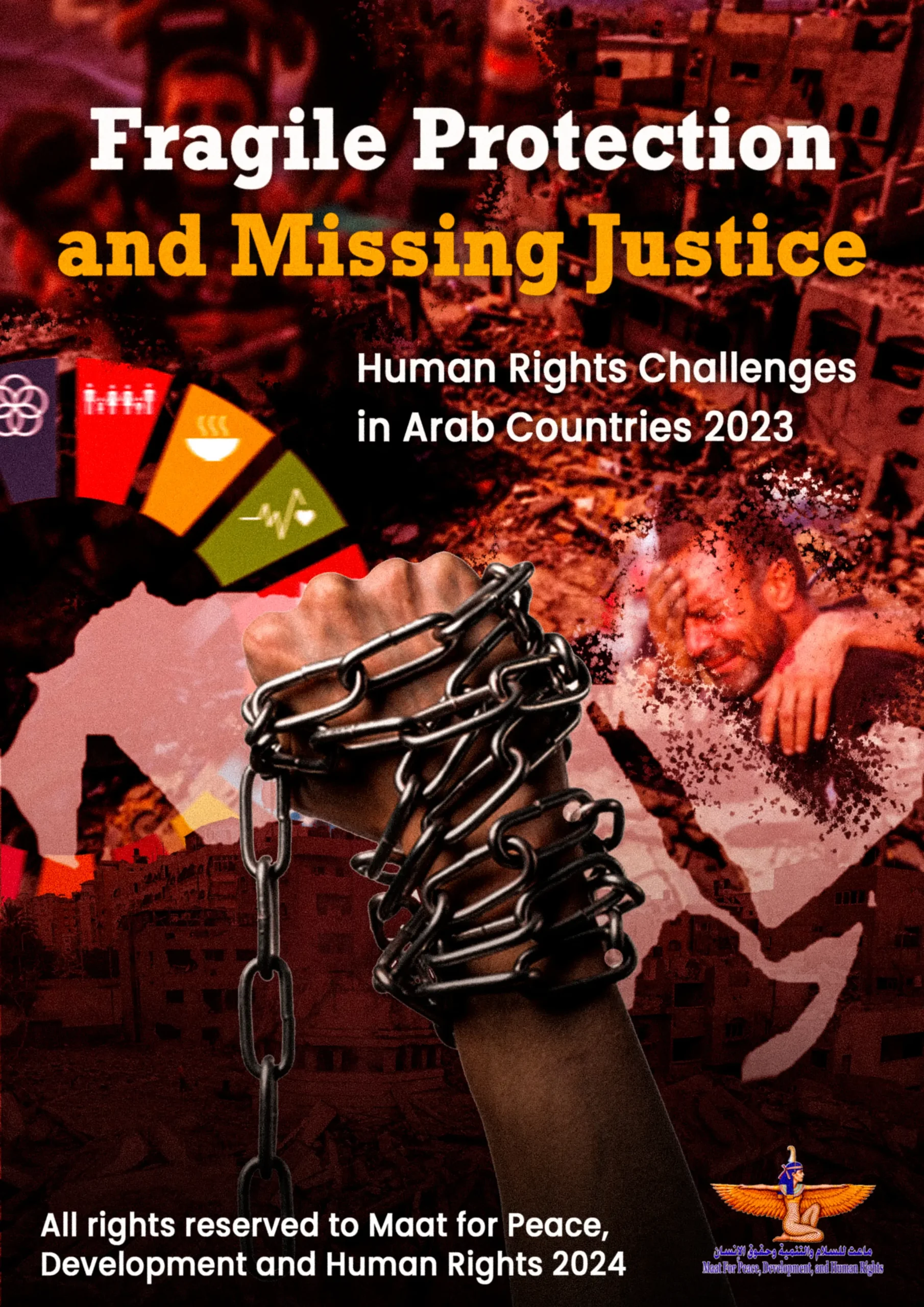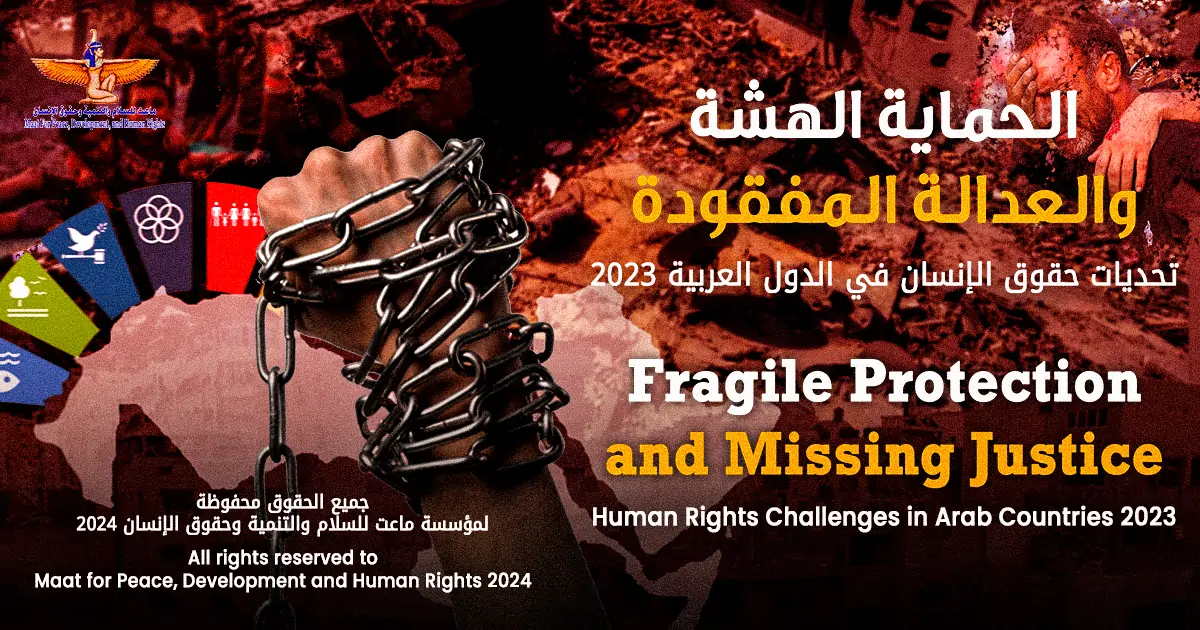Maat Issues its Seventh Annual Report on Situation of Human Rights in the Arab Region 2023
Okeil: Arab governments must listen to their people to help narrow the gap, and the human rights path that is consistent with international treaties and agreements requires additional steps from Arab governments
Abdel Hamid: Arab citizen is stuck between restrictions on freedoms and slowdown in achieving sustainable development goals
This morning, Saturday, March 16, 2024, Maat for Peace, Development, and Human Rights published its seventh annual report titled "Fragile Protection and Missing Justice: Human Rights Challenges in Arab Countries 2023." The release of the report coincides with the 55th session of Human Rights Council, taking place from February 26 to April 5, 2024, at United Nations Palace in Geneva. The report focuses on monitoring and analyzing human rights situation in 22 Arab countries throughout 2023, a significant year as it marked the 75th anniversary of the Universal Declaration of Human Rights. Unfortunately, this declaration faced a severe setback due to the approval given by prominent sponsoring countries to Israel, allowing it to wage a destructive war against the Palestinian people and commit crimes against humanity.
Maat report serves as a vital reference document that assesses the state of human rights in the Arab world. It adopts an objective, analytical, and legally oriented monitoring approach based on foundations and standards in line with these countries' provisions of national constitutions and international commitments. Similar to previous reports, this publication serves as an evaluation tool for human rights. It is comprised of four main sections. The first section presents Arab countries' stance on international human rights mechanisms during 2023. It provides a general overview and detailed observations on international agreements that Arab countries have ratified and their cooperation with international human rights mechanisms such as the Human Rights Council, Universal Periodic Review mechanism, treaty bodies, and special procedures. This section also delves into the challenges faced by Arab countries in collaborating with these mechanisms and offers an in-depth analysis of their efforts to address these challenges.
The second section explores Arab countries' progress in achieving the Sustainable Development Goals (SDGs). It provides a comprehensive analysis of their commitments to the SDGs and the obstacles encountered in their implementation. Additionally, it highlights the endeavors made by Arab countries to integrate sustainable development into their policies, programs, and initiatives. The second section explores Arab countries' progress in achieving the Sustainable Development Goals (SDGs). It provides a comprehensive analysis of their commitments to the SDGs and the obstacles encountered in their implementation. Additionally, it highlights the endeavors made by Arab countries to integrate sustainable development into their policies, programs, and initiatives. Finally, in the fourth and final section, the report focuses on the impact of the intense war initiated by Israel in the Gaza Strip following "Al-Aqsa Flood" operation on October 7, 2023. It specifically analyzes the human rights conditions in the occupied territories, with a particular emphasis on the residents of the Gaza Strip. The report concludes by presenting recommendations to the Arab League governments aimed at improving human rights conditions. These recommendations include further alignment with international treaties on fundamental human rights, timely submission of periodic reports to United Nations treaty committees while actively engaging with them, adopting a human rights-based approach to addressing economic and social rights within Arab countries, and working towards the resolution of armed conflicts in the region due to their detrimental effects on achieving the Sustainable Development Goals.
Ayman Okeil, an international human rights expert and Chairman of Maat, expressed the significance of launching the Arab Human Rights Report during these critical times. He highlighted the slow recovery from successive crises in the Arab region, ongoing wars, armed conflicts, and external interference that continue to devastate Arab societies. Okeil pointed out the lack of accountability for the losses of innocent lives in occupied Palestinian territories, Somalia, Syria, and Sudan, stressing the need for development in its broad sense.
Okeil acknowledged that some governments have started recognizing the challenges facing human rights situations, which marks the first step toward progress. He expressed hope for greater momentum that can be generated to improve the human rights landscape in the Arab region. Okeil emphasized that Arab governments must take additional steps aligned with international human rights treaties and conventions, with a focus on enhancing cooperation with civil society. He called for an end to wars and conflicts, the eradication of hate speech, and the promotion of peaceful coexistence as a shared destiny for all Arab societies. Okeil urged Arab governments to listen to their people, bridge the gap, and build trust, leading to a better and safer future for all.
Dr. Sherif Abdel Hamid, Vice Chairman of Maat for Research and Studies, highlighted the ongoing challenges in the human rights situation across Arab countries. He noted the prevalent restrictions imposed on non-governmental organizations and decline of press freedom in most Arab nations. The report also highlighted the loss of life in armed conflicts and areas of tension, with thousands of civilians killed during the covered period, including Sudan, Yemen, and the occupied Palestinian territories, which constituted a significant event in the Arab region in 2023. Additionally, the report emphasized the need for more positive measures to address the conditions of migrant workers and stateless women, particularly the Bidoon, in the Arab Gulf region.
Abdul Hamid emphasized the indivisibility of human rights and the interdependence of economic, social, civil, and political rights. He stated that the implementation of economic and social rights requires strengthening civil and political rights, as stated in the preamble of the Universal Declaration of Human Rights, which was celebrated by countries in 2023 on its seventy-fifth anniversary.

 |
 |
shortlink: https://maatpeace.org/en/?p=41715












